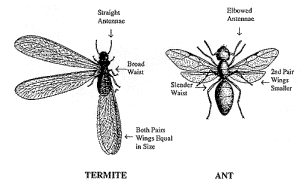|
 Ladybugs, ants, termites, broadleaf weeds Ladybugs, ants, termites, broadleaf weeds
By John
Fulton
 Send a link to a friend
Send a link to a friend
[April 30, 2012]
The alternating warm and cool weather
has brought about many interesting things, both inside and outside
the house. Inside the house, we have the Asian ladybugs to deal
with. We also have them outside, but that is less of a concern. As
we begin to clean up flower beds or piled leaves around the house we
will disturb resting places of the ladybugs. This will cause them to
seek a new place, and if it is warm and sunny enough, they may just
create a little bit of a nuisance outside. Inside, we have a
population coming out of hibernation. They have been there all
winter, but have been under or behind things so you didn't know they
were there. The best control around the house seems to be a cup of
coffee or a glass of water for them to fly into. Seriously, sucking
them up with a vacuum or spraying areas with an aerosol flying
insect killer is about as good as you can do.
|
 Another insect becoming active with the warm weather is the ant.
We are seeing winged ants being brought into the office on a
regular basis. Ants become winged when they are overcrowded in
their old colony and are seeking to start a new one. Many people
are concerned about the identification of these winged insects
to make sure they aren't termites. The process is relatively
simple. Just look at the last body segment, and if it has a
"pinched" waist, it is an ant. Termites don't have that
hourglass figure, but are shaped more like a cigar. A few
termite samples have also been brought in. Another insect becoming active with the warm weather is the ant.
We are seeing winged ants being brought into the office on a
regular basis. Ants become winged when they are overcrowded in
their old colony and are seeking to start a new one. Many people
are concerned about the identification of these winged insects
to make sure they aren't termites. The process is relatively
simple. Just look at the last body segment, and if it has a
"pinched" waist, it is an ant. Termites don't have that
hourglass figure, but are shaped more like a cigar. A few
termite samples have also been brought in.Broadleaf weed
control
Everyone seems to have been waiting for warmer temperatures
and the appointed date to begin broadleaf weed control programs.
Well, that time will come, believe it or not. For most of the
broadleaf products to work, the temperature has to be over 55
degrees. These chemicals do work better when it is warmer and
the weeds are actively growing. The first item of business is to
know what type of weeds you want to control. This will make a
big difference in what product or products you select.

The main products used for broadleaf weed control in lawns
are 2,4-D, MCPP, dicamba, a combination of those three products,
and triclopyr.
Let's start with the triclopyr since it's probably the
easiest to discuss. Its place in weed control is for
hard-to-control weeds and woody plants. It also improves control
of violets. It can be added to one or more other chemicals to
provide broad-spectrum control. Some blends now contain
trichlopyr, so check the label. There are many trade names for
products containing trichlopyr, and they seem to change every
year. Just check active ingredients.
[to top of second column] |

The old standby is 2,4-D. It is good on carpetweed, chicory,
dandelion, lamb's-quarters, plantains and wild carrot. There are
amine forms and ester forms. The ester will generally give better
control of more weeds and is generally not water-soluble (except for
a hard inch of rain soon after application), but it does have vapor
drift potential. MCPP is good on chicory, lamb's-quarters and white
clover.
Dicamba is good on black medic, chickweeds, chicory, dandelion,
dock, henbit, knotweed, lamb's-quarters, pearlwort, purslane, red
sorrel, thistles, white clover, wild carrot and yarrow.
The combination of all three products will pick up all of those
listed for the individual products, plus a few more such as mallow,
speedwell and wild onion. The combinations are sold under many
different trade names, so check the active ingredient list for ones
you need.
My annual disclaimer for application of these types of products
is: Beware of potential drift. Not only can the spray move under
windy conditions while you are spraying, but particularly with
dicamba, the products can drift as a vapor for up to two weeks after
spraying if the conditions are hot and humid.
[By
JOHN FULTON,
University of Illinois Extension]
 |